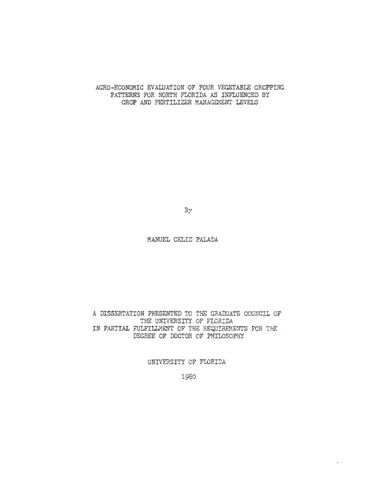Agro-economic evaluation of four vegetable cropping patterns for north Florida as influenced by crop and fertilizer management levels
Abstract
Appropriate crop management technologies for year-round vegetable cropping systems are essential to increase productivity and improve farm income among small-scale vegetable farmers. A 2-year study was conducted to determine and evaluate the influence of crop and fertilizer management levels on productivity, income, and nutrient levels in soil from four vegetable cropping patterns for North Florida and to develop appropriate crop and fertilizer management practices for sequential vegetable cropping systems.
Seven vegetable crops were classified into three management groups (low, LM; medium, MM; and high, HM) and planted in four cropping patterns (HM-KM-HM, LM-IM-LM, HM-MM-LM, and HM-LM-MM). Vegetable crops included bulb onion (Allium cepa L.), collard (Brassica oleracea L. Viridis Group), English pea (Pisum sativum L.), mustard (Brassica juncea L. Czern. and Coss.), pole bean (Phaseolus vulgaris L.), southern pea (Vigna unguiculata L. Walp.), and crockneck squash (Cucurbita pepo L.). The four cropping pattern main plots were split into three fertilizer level sub-plots (low, medium, and high N and K) arranged in a. randomized block design.
Cropping duration was longest in cropping pattern HM-HM-HM (bulb onion-pole bean-collard) and shortest in LM-LM-LM (English pea-southern pea-southern pea) and HM-LM-MM (bulb onion-southern pea-mustard). At the end of the cropping sequence, soil pH was lower than the initial value in all cropping patterns, but the difference between initial and final pH was greater in cropping patterns HM-HM-HM, HM-MM-LM, and HM-LM-MM than in LM-LM-LM. Soil organic matter content decreased, whereas total soluble salts increased in cropping pattern HM-HM-HM, where high levels of fertilizer were applied. Cropping pattern LM-LM-LM resulted in highest soil organic matter content after harvest of the third crop. Soil N and exchangeable K were significantly higher in cropping pattern HM-HM-HM than in the other cropping patterns. Exchangeable K increased as fertilizer level increased in all cropping patterns.
Increases in marketable yields were not observed with increasing fertilizer level except for bulb onion, squash, and English pea, where significant yield responses resulted from application of the medium fertilizer level. Cropping pattern HM-HM-HM resulted in significantly higher resource use and gross and net incomes, but rates of return to production inputs such as fertilizer, labor, cash, and management were similar among the cropping patterns. Planting low management and a combination of high, medium, and low management crops in sequential vegetable cropping patterns required low production inputs and were efficient and profitable. Such cropping patterns offer greater yield stability and the possibility of improved farm income.
Description
Digital copy available
Suggested Citation
Palada, M. C. (1980). Agro-economic evaluation of four vegetable cropping patterns for north Florida as influenced by crop and fertilizer management levels (Unpublished Doctoral dissertation). University of Florida, Gainesville, Florida.
Type
DissertationSubject(s)
Department
Graduate CouncilDegree
Doctor of PhilosophyPhysical Description
xi, 100 pages
Collections
- Dissertations [3]


